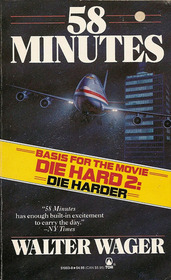I would not have picked this novel up if it weren't for the giant "Basis For The Movie DIE HARD 2: DIE HARDER" plastered across the front cover. Not that I'm a huge fan of the movie, either, considering its the worst example of cookie-cutter-sequel garbage, far worse than the two films that followed it. However, I'm always interested in how novels differ from their big screen counterparts.
The first two chapters are pretty much what you expect. Flowering scene-setting description of the Big Apple in the winter, and a sharp and brutal introduction to the villains. The lead bad guy and all of his henchmen are what you expect, and are handled competently. They are cold and calculating, diverse and colorful, and most of all, deadly and ruthless.
Then we meet the hero, and it all falls apart.
The irony is bittersweet. In the Die Hard series, the selling point of the John McClain character is his lack of superhero credentials. He isn't the best there is at what he does, he's just the wrong guy in the wrong place at the wrong time, an ordinary man under extraordinary circumstances surviving by the skin of his teeth with a lot of luck and determination.
Now meet Captain Frank Malone. In just one six page chapter, we learn that Frank Malone is; a handsome blue-eyed blond,instantly intimidating, two-year best Ivy League Quarterback, an expert hand-to-hand combatant, NYPD pistol champion, cool under attack, admitted to both Harvard and Columbia law schools, a highly decorated hero, the youngest captain in the force, and recognized by all New York cops as a first-class commander, and powerful yet merciful role model.
Bored yet?
This kind of over-the-top jack-of-all-trades Super Cop, clones of which can be found littering Clancy-Lite terrorism thrillers like this by the dozens, are barely recognizable as human beings, let alone realistic characters that lend themselves to the reader's sympathies. When Doc Savage wannabes like Frank Malone swagger onto the scene, there's no doubt that the bad guys don't stand a chance. But where's the fun in that?
Thrillers usually work because we like to watch someone prevail against overwhelming odds, but stacking the chips in favor of a nearly perfect hero caricature leaves the reader betting on a sure thing, which assures a happy ending but destroys any real tension or suspense.
The first two chapters are pretty much what you expect. Flowering scene-setting description of the Big Apple in the winter, and a sharp and brutal introduction to the villains. The lead bad guy and all of his henchmen are what you expect, and are handled competently. They are cold and calculating, diverse and colorful, and most of all, deadly and ruthless.
Then we meet the hero, and it all falls apart.
The irony is bittersweet. In the Die Hard series, the selling point of the John McClain character is his lack of superhero credentials. He isn't the best there is at what he does, he's just the wrong guy in the wrong place at the wrong time, an ordinary man under extraordinary circumstances surviving by the skin of his teeth with a lot of luck and determination.
Now meet Captain Frank Malone. In just one six page chapter, we learn that Frank Malone is; a handsome blue-eyed blond,instantly intimidating, two-year best Ivy League Quarterback, an expert hand-to-hand combatant, NYPD pistol champion, cool under attack, admitted to both Harvard and Columbia law schools, a highly decorated hero, the youngest captain in the force, and recognized by all New York cops as a first-class commander, and powerful yet merciful role model.
Bored yet?
This kind of over-the-top jack-of-all-trades Super Cop, clones of which can be found littering Clancy-Lite terrorism thrillers like this by the dozens, are barely recognizable as human beings, let alone realistic characters that lend themselves to the reader's sympathies. When Doc Savage wannabes like Frank Malone swagger onto the scene, there's no doubt that the bad guys don't stand a chance. But where's the fun in that?
Thrillers usually work because we like to watch someone prevail against overwhelming odds, but stacking the chips in favor of a nearly perfect hero caricature leaves the reader betting on a sure thing, which assures a happy ending but destroys any real tension or suspense.
The first DIE HARD movie was based on this book. The book is MUCH better--surprise! A good diversion.




